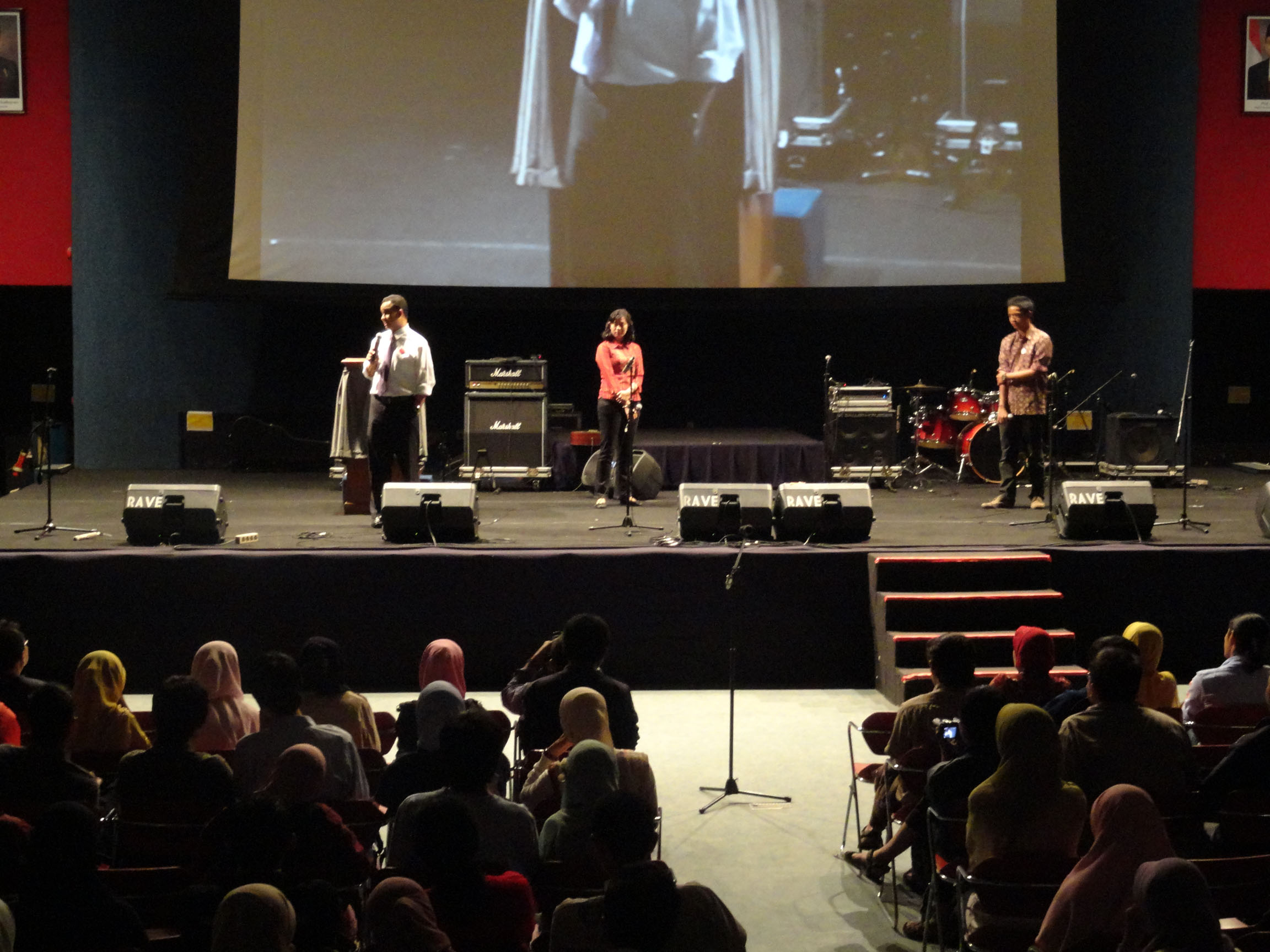ITB Alumni ITB Shared Their Experiences as Young Educators
By Amelia Rahma Faustina
Editor Amelia Rahma Faustina

 BANDUNG, itb.ac.id - On Tuesday (29/11/11), Gerakan Indonesia Mengajar (Indonesia Educates Movement) roadshow was held in Sabuga, featuring Anies Baswedan, initiator of the movement, alongside the first batch of Pengajar Muda (young educators) who were just returned from their one-year duty of educating children in Indonesia's remote areas. Of the 51 Pengajar Muda, 15 are ITB alumni. Two of them, Aline (biology, 2005), and Adi (Electrical engineering, 2004), shared their experiences to the audiences on the session, which comprised of teachers, students, and other members of the community.
BANDUNG, itb.ac.id - On Tuesday (29/11/11), Gerakan Indonesia Mengajar (Indonesia Educates Movement) roadshow was held in Sabuga, featuring Anies Baswedan, initiator of the movement, alongside the first batch of Pengajar Muda (young educators) who were just returned from their one-year duty of educating children in Indonesia's remote areas. Of the 51 Pengajar Muda, 15 are ITB alumni. Two of them, Aline (biology, 2005), and Adi (Electrical engineering, 2004), shared their experiences to the audiences on the session, which comprised of teachers, students, and other members of the community.
Education is still considered a tertiary needs that not everyone can enjoy in this country, even after Indonesia has 66 years of independence. There are 4.7 millions students who entered the school system, but only 600.000 earned a college degree. Gerakan Indonesia Mengajar, founded in 2010, was aimed to encourage college students to engage directly with children in indonesia's remotest areas, where there's a shortage of teachers. "We only have two choices: to continue to look away from the problems or, to work it out. As a student, of course, the only choice is to work the problems out." Anies Baswedan said.
Embarking on A Journey, Both As A Teacher and A Student
Aline and Adi shared a lot of inspiring stories when they were teaching in Majene, Province of West Sulawesi, and South Halmahera, Province of North Maluku, respectively. One of their mission was to become the role model for the community: parents in those communities would be able to see them as a projection of their own children in the future. To Aline and Adi's surprise, parents in those two disparate communities shared the same perception toward their children: they see their children as naughty and stupid kids.
When Adi first entered the classroom, there was a rattan rod was on his desk: it is provided to every teacher as a tool to discipline the students. Adi finally succeeded in proving to the community that such tool isn't necessary to educate children-he proved that action speaks louder than words. As a result, Adi's students won first place in a number of local competitions.
Aline told a story on how she has to face a student who refused to go to school. She made a personal approach toward that student, and finally convinced him to return to school. Aline said that being a Pengajar Muda she learned a lot about patience, communication, and life in general.
Pengajar Muda were not only teaching schoolchildren; they are expected to participate actively in the community where they were placed. Aline came as a young girl without any cooking skill and in Majene, she learned how to cook and involved in cooking events with the local women. She succeeded in blending in with the community. Firman (Geophysics Engineering 2005), who were a Pengajar Muda from the first batch, shared his experience as a 'shaman' who were able to cure any diseases.
Teaching For A Year, Inspiring For A Lifetime
Gerakan Indonesia Mengajar didn't emerge all of sudden, devoid of context. Back in the 50s, The Indonesian Government established a program called, Pengerahan Tenaga Mahasiswa (PTM), where college students were sent to remote areas to became teachers. It was established during the time when college education was not as affordable as it is now. Eight students served for a two-years period. Because of the program, ten years later, numbers of college students from lower to middle class economy increased significantly.
Anies said that he has met of former students of the eight who succeeded in various walks of life.
Unfortunately, the program was discontinued and changed into the Kuliah Kerja Nyata program, where college students only required serve for a couple of months. Gerakan Indonesia Mengajar is inspired by the spirit of PTM-continuing the effort to spread new hopes for Indonesia. Pengajar Muda will open new windows to children in remote areas to look out to, as well as sharing Indonesia's point of view to the outside world.
"This republic isn't a complete accomplishment, we still have to fulfill The Promises of Our Independence," concluded Anies. The promises are each of Indonesians rights to be safe and protected, to live prosper, to be educated, and to contribute to the implementation of a world order based on freedom, lasting peace and social justice.

.jpg)
.jpg)
.jpg)
.jpg)


